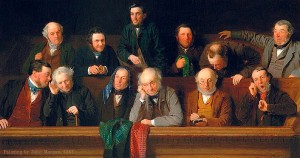There may be no better example of an evil, real-world villain needing to get justice (good and hard) than the Pittsburgh synagogue shooter.
Since he survived the shoot-out, he must now be put on trial.
But by whom?
In Allegheny County Court, Pittsburgh police filed a 34-count criminal complaint against the mass murderer. Meanwhile, the federal government has filed its own charges.
“The federal criminal complaint . . . charges him with 29 felonies, including 11 violations of 18 USC 247, which authorizes the death penalty for fatally obstructing any person’s ‘free exercise of religious beliefs,’” summarizes Jacob Sullum at Reason. “Such a crime can be prosecuted in federal court as long as it ‘is in or affects interstate or foreign commerce.’”
Yes, that’s the Constitution’s Commerce Clause being cited. You see, the guns used were — get this — not made in Pennsylvania.
Call it the insanity clause.
“There is no general, overarching federal police power,” Andrew C. McCarthy explains in National Review. “Under the Constitution, the states were supposed to handle virtually all law enforcement, and certainly all enforcement involving offenses committed wholly within their territories — common crimes of violence.”
Why flout this principle? Historian Brion McClanahan says the Republicans, in this case, just cannot help themselves — posing as the “law and order” party, they feel the need to be seen to “do something.” So Attorney General Jeff Sessions tortures the Constitution to intervene where the federal government does not belong.
Not only is the State of Pennsylvania constitutionally authorized to handle the Pittsburgh synagogue massacre, it is more than competent to do so.
The federal government should, for once, stick to its own constitutional business.
This is Common Sense. I’m Paul Jacob.





